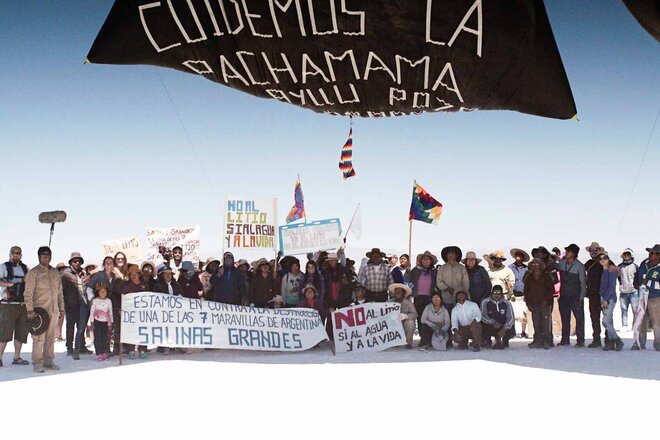Peticija je upućena:
Interamerican Comission on Human Rights
WATER AND LIFE ARE WORTH MORE THAN LITHIUM
Respect and recognition of the Territory of Salinas Grandes and Laguna de Guayatayoc as a sacred, natural, ancestral and cultural heritage site, free of lithium mining.
https://territoriosalinasgrandesylagunaguayatayoc.ar/
Convinced of the legal, philosophical and spiritual framework that allows our indigenous communities of Salinas Grandes to sustain a concept of development related to a mode of identity that reproduces a culture and defines an identity that pre-exists the State, as established in the Kachi Yupi, we ask the authorities:
- That the entire Territory of Salinas Grandes and Laguna de Guayatayoc be respected and recognised as a sacred site, natural, ancestral and cultural heritage, free of lithium mining.
- To work together with the indigenous communities that have inhabited the community territory for more than eleven thousand years so that this recognition is legalised at provincial, national and international level.
- That the "Kachi Yupi" Protocol (ILO Convention 169) be applied, for consultation and free, prior and informed consent in dealing with the indigenous peoples who inhabit the territory.
Given the urgency of facing the energy transition due to the exacerbation of the climate crisis, the indigenous communities of the Salinas Grandes and Laguna Guayatayoc basin, Jujuy, Argentina, request the signatures of the national and international community to support the resounding rejection of lithium mining and the recent advance of corporate lithium projects in the high Andean wetlands. Global war dynamics and energy transitions in the North increasingly push for the expropriation of the region's commons.
Obrazloženje
In Salinas Grandes, more than thirty-eight native communities live together as a community, where the territory is considered a unit without environmental, social or cultural divisions or dismemberments.
From its origins, the culture of the communities, our customs and beliefs, represent a worldview that is rooted in the values of nature. Pachamama - Mother Earth - appears as the backbone of the activities and each one of them unfolds at the pace that the land allows. We resort to different types of production, according to the seasons, in order to optimise the use of existing natural resources. We conserve many of the ancestral techniques developed in relation to house building, agriculture, shepherding, ceramics and weaving. The salt flats are a fundamental part of our history and identity and from our perspective salt is not simply an economic resource, but a "living being", it has a breeding cycle, just like crops. Among the activities that stand out are salt breeding - a basic complement that allows us to obtain other resources - and the development of national and international tourism that visits Salinas Grandes.
There are currently 38 lithium mining projects out of a total of 60 in various stages of development in the country. Jemse, the Jujuy government's state mining company, has tendered 8 projects with a total of 11,000 hectares to the company Pan American Energy (Bridas, China National Offshore Corporation, British Petroleum), in violation of the law: without the consent of the inhabitants. This state company, associated with foreign capital, intervenes in the community life of the indigenous peoples, fragmenting popular positions and buying their will.
The main body of water in this basin is a wetland, which plays a vital role in regulating all the waters of the basin, which are connected at its bottom. Lithium mining requires two million litres of water to extract one tonne of the material. The salt flats constitute a unique ecosystem, which has always provided the indigenous communities with the material resources necessary for their livelihoods, through work, salt production and tourism.
The relationship between the indigenous peoples and the salt flats is as important, if not more so, than the material dimension, because it has a unique spiritual character: they are our home and our only means of subsistence, the resting place of our ancestors and the place where we develop our identity and culture. In the Salt Flats we live in perfect harmony with the environment, taking care in a practical and conscious way not to affect the delicate natural balance of which we are a part. The salt flats are a necessary condition for the existence of the indigenous communities that inhabit them. Without the salt flats, they would disappear.
In January 2023, concerned about the care of Mother Earth, the Indigenous Communities met in the town of Alfarcito and signed a Declaration on the rights of the Salinas Grandes and Laguna de Guayatayoc basin, in which among many other considerations we say; ...our basin is a treasure, an environmental, social and culturally invaluable treasure, a source of pride for us and for the Province of Jujuy. It was distinguished as one of the seven wonders of our country. It constitutes our territory in a sanctuary worth to be preserved, strengthened and presented to the world. And not transformed into an industrial zone, a desert without water, life or people, as lithium mining would do in a few years.

